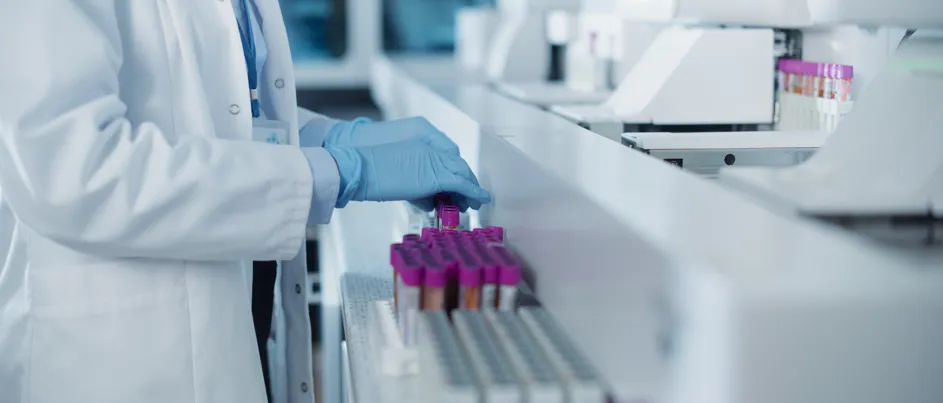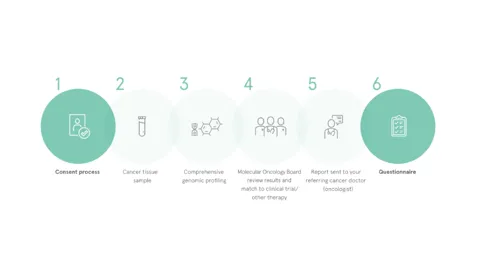

This page focus on 2 main types of genetic testings:
- Somatic testing (Tumour profiling) – a tumour tissue sample is collected through a biopsy and analysed, it can help select better therapies and treatments
- Germline Testing – a blood or saliva sample can identify people with inherited risk of pancreatic cancer
1. Somatic testing |
2. Germline testing |
|
|---|---|---|
Also called |
|
Inherited cancer risk testing |
DNA from... |
Tumour tissue sample or blood sample (liquid biopsy) if tissue is not available |
Blood or saliva |
It may help... |
select tailored and most effective treatments based on the tumour. |
identify a family risk of developing pancreatic cancer, so people can take proactive and preventative actions. |
What is genomics?
Your genome (also called your DNA) is the operating manual containing all the instructions that helped you develop from a single cell into the person you are today. Your genome guides your growth, helps your organs to do their jobs, and repairs itself when it becomes damaged. It's unique to you.
Advances in genome technology are leading to an understanding of cancer and new ways for diagnosing and treating many types of cancer.
Every pancreatic cancer patient is different. Patients who have received personalised treatment based on their biology have received benefits from targeted therapies.
Your DNA
- DNA (deoxyribonucleic acid) carries the information and templates for making and maintaining all living things, including people
- DNA contains long chains of chemicals called bases
- These chains coil into 46 chromosomes, 23 from each parent
- RNA (ribonucleic acid) is similar to DNA; it also contains long chains of bases connected by a sugar ‘backbone’
- Genes are the 1–2% of our genetic code that act as templates for making proteins
- Proteins do most of the work in our cells so we can grow and stay healthy
- Changes in our DNA are called variants. Variants can also be seen by looking in the RNA
- Most variants help to make us different from each other or have little to no impact, but others can affect our health and development
- Health conditions that are caused by genetic variants are called genetic conditions
Genome
- A complete set of DNA is called a genome
- Our genome is like a recipe book, handed down through generations of a family. The recipes are for making us and keeping us healthy. They also hold information about our families: past, present and future.
- We get half our genome from our mother and half from our father. So most of our cells have two mostly similar volumes of the recipe book, one from each parent. They are mostly similar, but have some differences.
1. Somatic genetic testing
Pancreatic cancers have changes (mutations) in particular genes or proteins which help the cancer grow or make the cancer resistant to a particular treatment.
Doctors are increasingly testing pancreatic tumours to check for these changes in genes or certain proteins that may be helping the cancer grow. This testing – which is often called molecular profiling, tumour testing or biomarker testing – often involves genomic profiling that helps doctors to know more about the genes and proteins within the tumour.
Not all pancreatic cancers are the same. This testing provides a molecular profile of small, yet important features, of the cancer. This molecular profiling supports what's known as precision medicine, which aims to match each person with the treatment that will work best for them and their unique genetic make-up.
How does somatic testing work?
A tissue sample is collected through a biopsy (or sometimes a blood sample referred to as a liquid biopsy, if tissue is not available).This is usually taken from one of your diagnostic tests or procedures.
The sample is analysed for mutations or other alterations that occurred in the pancreatic cancer cells during life. Somatic mutations can be caused by environmental factors.
Pankind recommends that all people diagnosed with pancreatic cancer explore genomic testing, if they wish to, as soon as possible after diagnosis as it may provide important information.
Genetic changes in pancreatic cancer
Multiple combinations of genetic changes are commonly seen in pancreatic cancers. These changes can be grouped into different categories:
Genetic changes that turn on ‘oncogenes’. Normally, oncogenes help control cell growth and survival, but when mutated, they act like a stuck accelerator pedal in a car, causing uncontrolled cell growth and leading to cancer.
Mutations in the KRAS gene are the most common, found in more than 90% of pancreatic cancers.
Some genes act as the body's natural defence system helping to prevent cells from becoming cancerous.
In pancreatic cancer, genes like TP53, p16/CDKN2A, and SMAD4 may stop working properly, allowing cancer to grow and spread.
Certain genes, such as hMLH1 and MSH2, help fix damaged DNA. When they don’t work correctly, errors build up, increasing the risk of cancer.
Most of these changes happen over a person’s lifetime and are not inherited.
Why do these genetic changes matter?
- Targeted treatments: Studies show that up to 25% of people with pancreatic cancer have specific genetic changes that may be targeted with treatments. These are called ‘actionable mutations’.
- Personalised medicine: Doctors can use genetic profiling to match people with treatments that may be most likely to work based on their cancer’s unique genetic makeup.
- Future research: Scientists continue to discover new genetic changes, leading to the development of new and more effective treatments.
Free access to somatic testing
One of the options we recommend is Omico.
They have received funding to provide free comprehensive genomic profiling (CGP) for 23,000 eligible Australians through its Cancer Screening Program called CaSP.

Everyone who has been diagnosed with pancreatic cancer regardless of cancer stage can access this program with a referral from their oncologist.
The process typically takes 8–10 weeks from when the patient has consented to participate for your referring doctor to receive the CGP and other reports. In urgent cases, as notified to the Omico CaSP team by your referring doctor, results will usually be provided in 5–6 weeks.
Centralising information about trial eligibility is key to attract more trials in Australia.
2. Germline Genetic Testing
Genetic testing is the study of information in the DNA of a person. Germline (genetic) testing analyses saliva or blood for genetic changes a person was born with. Germline changes are inherited from your parents. There are a number of different types of genetic tests for the different types of variations and also the type of genetic condition in question.
NSW based eviQ guidelines, along with international bodies such as the US National Comprehensive Cancer Network (NCCN) guidelines recommend considering germline testing in any person diagnosed with pancreatic cancer. This is because studies have shown that up to 11% of people diagnosed with pancreatic cancer have an inherited germline change that is carried in their family.
We recommend discussing Germline Genetic Testing with your GP or pancreatic cancer specialist.
The NSW Government eviQ site has many helpful resources for genetic testing in Pancreatic Cancer. Some of these are:

Contact Dianne, Support Navigator
on 1800 003 800 for information and find out about the services and support that may be available for you and your family.


